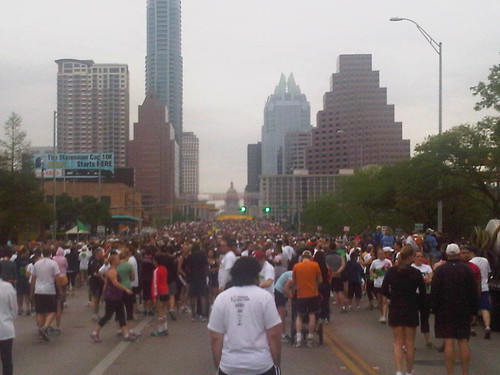 “In my professional opinion, I don’t think you should be running.”
“In my professional opinion, I don’t think you should be running.”
It was the early 1980s. The words still ring loudly in my mind. I had experienced some knee problems during my growth spurt as an adolescent. I had my share of knee surgeries – and probably your share as well. I had a well-respected orthopedist who told me I should never run, but that it would be alright to swim or bike. How could I ever doubt “the expert”?
Not long after that, I became a physiotherapist. I focused my career on orthopedics and sports injuries. Countless patients over the years have been told the same things that I was told. They have put their faith in conventional thinking, in traditional medicine, much as we have been taught to do over the years. Many haven’t asked enough questions. All have come to me feeling frustrated and hopeless. I understand the feeling well, having been there myself.
But today, I stand here having just completed my 10th consecutive Capitol 10K in Austin. That’s 100K of running in one event alone over the past decade - not bad for a guy that shouldn’t be running at all, according to the experts. So how did this happen?
Over the past two decades, I have found myself buried in the sports science and sports medicine literature. I have found myself challenging a lot of currently-held beliefs.
We’ve all heard how running is bad for us. And many have just accepted that statement as fact. But I challenged that belief, and found that, well, there really isn’t much scientific evidence to make such a generalization. Hell, if it was so bad for us, then the human species as a whole would have been in trouble a long time ago with all of the unshod running through the jungles and over hill and dale. I think we’ve survived just fine.
If you got past the belief that “running is bad for us”, then you have probably been subjected to the statement that “running causes your joints to degenerate”. Once you do a little research, you may find some evidence that those patients who have had a previous knee injury tend to have degenerative changes over time – running, or no running. But don’t we all? And by the way, those same changes noted on an x-ray don’t predict if the patient is going to have symptoms – or not.
We do know, without question, that humans adapt to the demands imposed on them. That is how we’ve been able to fight gravity since the dawn of history. A training stimulus leads to a training adaptation, given an appropriate environment in which to do so.
Fortunately, I took the time to challenge the norm for the benefit of my patients. Twenty-three years of clinical practice is a lot of time to observe patients recovering from various injuries, and go on to return to the sport they so loved. I even got to the point of summarizing much of my 20+ years of clinical and coaching experience in a book entitled “RunSmart: A Comprehensive Approach To Injury-Free Running” (details here), which I published in 2008.
In the midst of this process, I realized I should be challenging my own personal beliefs for my personal orthopedic challenges. I was one of those people, one of those patients, that had simply accepted “the truth” from “the expert”. I was one of those patients frustrated by the ramifications of this “truth”. I didn’t know better at the time. I do now.
I developed my own plan to allow me to run, to do so safely and successfully, and to allow me to partake in events like the Capitol 10K. This past weekend, I hit the roads with 23,000 other runners to take part in the 34th annual running of this Austin tradition. This was my 10th consecutive Capitol 10K. I took a moment to reflect and be thankful for having the ability to do so, and I was reminded that knowledge is, indeed, power.
Who knows what the future holds, but I do know one thing – and that is that if we don’t challenge those beliefs, many more people will simply give up just because someone told them that “running is bad”. Don’t give up. You might just put in a 100K or so of Capitol 10Ks – and look forward to another 100K or so.
Photo credits: abesselink

 "Running Injuries: Etiology And Recovery- Based Treatment" (co-author Bridget Clark, PT) appears in the third edition and fourth editions of "Clinical Orthopaedic Rehabilitation: A Team Approach" by Charles Giangarra, MD and Robert C. Manske, PT.
"Running Injuries: Etiology And Recovery- Based Treatment" (co-author Bridget Clark, PT) appears in the third edition and fourth editions of "Clinical Orthopaedic Rehabilitation: A Team Approach" by Charles Giangarra, MD and Robert C. Manske, PT.
 Allan Besselink, PT, DPT, Ph.D., Dip.MDT has a unique voice in the world of sports, education, and health care. Read more about Allan here.
Allan Besselink, PT, DPT, Ph.D., Dip.MDT has a unique voice in the world of sports, education, and health care. Read more about Allan here.
 Top 5 finalist in three categories: "Best Overall Blog", "Best PT Blog" and "Best Advocacy Blog".
Top 5 finalist in three categories: "Best Overall Blog", "Best PT Blog" and "Best Advocacy Blog".